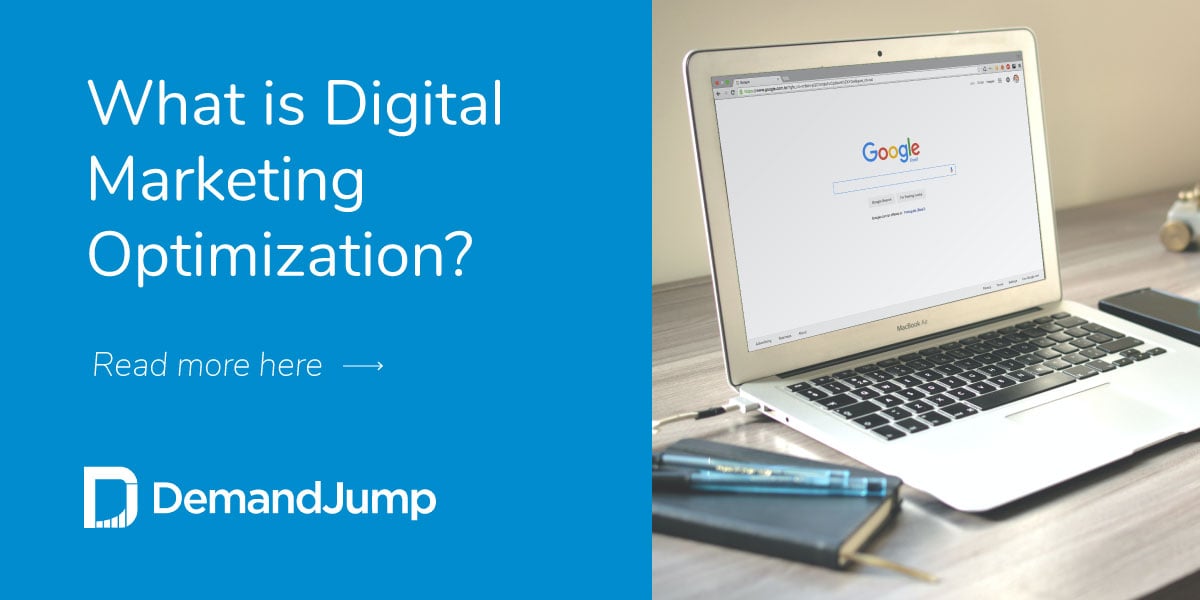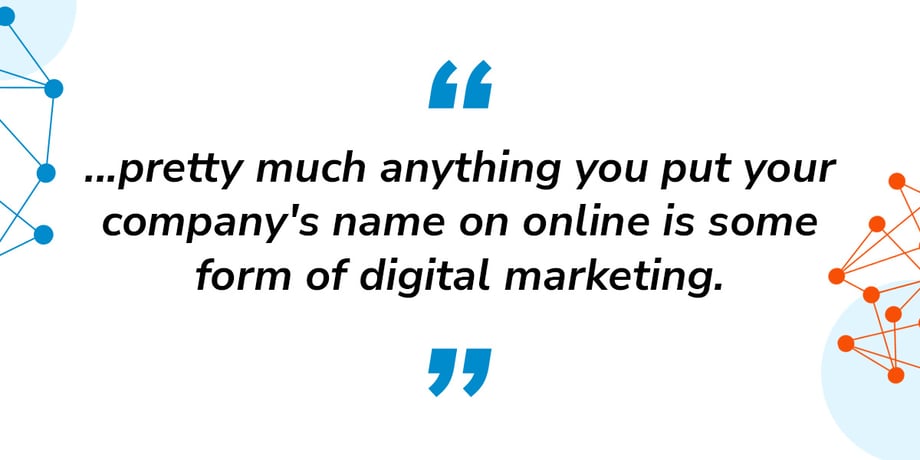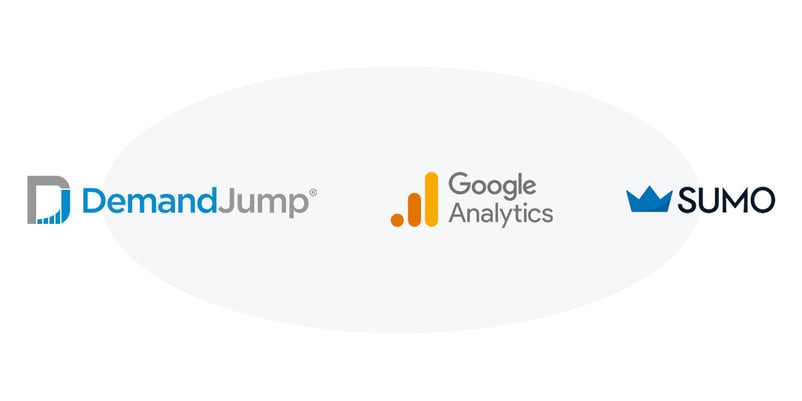What is Digital Marketing Optimization?
April 28, 2020 •DJ Team

You've probably heard the phrase "digital marketing", and you may even understand that you need to to get better at it. But, what exactly does this look like? Obviously, you can't go forth and make your digital marketing efforts as optimal as possible if you don't really know what's involved with the whole thing in the first place. That's why we've created this digital marketing overview. Soon, you'll have a better understanding of what digital marketing is, why it's important, what channel optimization truly means in this technological age that we live in.
Digital Marketing
A digital marketing strategy encompasses numerous facets of communication, advertising, and brand-building—all while using technology as the foundational channel through with to deliver messages. Digital marketing encompasses everything from a company's website to the emails it sends out to its social media presence. In other words, pretty much anything you put your company's name on online is some form of digital marketing.
Digital marketing differs from traditional marketing in that digital marketers typically look toward content marketing and other digital outlets to get their messages across to their audiences. Digital marketing affords marketers the ability to gather data from many sources, enabling them to create campaigns that are much more targeted and focused than traditional marketing efforts allow.
Digital marketing includes an assortment of digital media, including (but not limited to):
- Search engine optimization (SEO)
- Search engine marketing (SEM) and pay-per-click (PPC) advertising
- Social media marketing
- Content marketing
- Affiliate marketing
- Influencer marketing
- Email marketing

In each of these channels, marketers are able to collect a wide assortment of data, such as where visitors come from, how many people are engaging with certain campaigns, and which keywords and content are getting the most attention.
What is Digital Optimization?
Digital optimization is the process through which digital technology is used to improve existing operating processes and business models. In the past few years, companies have begun to embrace digital marketing optimization techniques like never before. Why? Because with today's tools, brands have greater leverage to hone in on their target markets, understand their consumers' behaviors, and apply campaigns that speak directly to the wants and needs of their customers. Plus, when digital strategies are deployed optimally, companies are more likely to rank higher on search engine results pages (SERPs), thereby getting more attention from the people who are searching for particular products and services.
A marketing optimization model affects many departments within a business—not just the marketers who are tasked with creating the strategies. When you employ a digital marketing optimization strategy, the process flow will look similar to this:
Collecting and Analyzing Marketing Data
Each phase of the digital marketing lifecycle generates its own types of data. Using this information, you can glean valuable insights, such as:
- Which browsers and devices people are using
- What type of behavior brought people to your website or certain pages
- Which campaigns are most successful
- Cost per visit
The collection and analysis step includes three phases of digital media optimization:
- Attracting customers. You want to track your buyers' journeys from the very beginning so you can create campaigns that ultimately attract more eyes and garner your brand more attention.
- Converting customers. This phase is particularly useful to your sales team, as it helps ensure you're attracting qualified leads, which are more likely to convert into customers. This is where web forms, landing pages, and cost-per-lead analysis are important.
- Close. Once you've taken a customer from the top of your sales funnel to the closing stage, you'll want to be sure you have all the information necessary to track that person's behaviors along this way. This might include the time to sale, time to first contact, and time since last contact. Your sales team is likely paying close attention to this type of metric.
Refining and Automating
Your digital marketing strategies shouldn't run on auto-pilot. You should have a team of dedicated professionals who are constantly reviewing the successes and opportunities associated with your efforts so you can refine and tweak strategies to get the best results. Once you have things in a good place, consider automating the process in a way that enables your data to still be constantly reviewed, while relieving many of the manual processes that can otherwise be quite time-consuming.
Campaign Optimization Analytics
The campaign optimization process enables you to personalize your messages to ensure you're getting the most ROI and leads from each individual campaign. No two campaigns are alike, and even though they might sell similar products or services, the people you're targeting, the time of year you're targeting them, or the opportunities you've learned from prior campaigns can help redirect your future marketing campaign optimization tactics. The campaign optimization process usually looks like this:
Define your strategy
Don't silo certain elements of your campaign into their own boxes. For instance, you shouldn't think of email marketing on one hand and social media marketing on the other. Both of these elements are pieces of your overall strategy and should be considered as such. Determine your strategy first—that is, what are you trying to learn and achieve?—then build your marketing mix around the channels that are most likely to help you meet your goals.
Incorporate metrics from the start
You'll never know how well you're doing (or not) unless you have measurable metrics in place from the very beginning. Establish what you're trying to achieve, where you're at right now, and how you plan to measure changes as your campaign progresses.
Alter your messages to make the best use of various platforms
Look at it this way, you're not likely to post something on LinkedIn that's an exact match for something you Tweeted; you'd alter the message and context to make the most sense for your audience. The same is true for all digital channels; you never want to shoehorn your messages into every channel because your messages will quickly become lost or confused.
Marketing Digital Optimization Examples
Now that you know a little more about digital optimization, let's talk about some examples of great ad optimization techniques.
Paid Search Optimization
With paid search advertising, there are many different techniques you can use to optimize your ad spend. A few that DemandJump automates for you include: adjusting your bids to improve performance, adding keywords to your campaigns based on dynamic consumer behavior, adding negative keywords to your campaigns so you don’t waste money bidding on useless terms or against yourself with other campaigns you are running.
Display Advertising Optimization
Display advertising optimization largely comes down to who you are targeting and where. The best ways to optimize your programmatic display ads are to identify the optimal websites to advertise on. And considering there are over 2 billion websites on the planet, without artificial intelligence, it can be impossible to to identify the most relevant & high performing websites for your ads. That’s why DemandJump automates this analysis for you and finds the websites your target audience visits along the path to purchase.
Digital Marketing Optimization Tools

There are many free digital marketing tools available these days. Here are some of the best digital marketing tools 2020 has to offer:
- DemandJump - DemandJump is an analytics platform that removes the guesswork from marketing by revealing more of the customer journey and competitive landscape than you could ever see before.
- Google Analytics - Google Analytics is almost always going to make these lists because it's a powerful resource that's right at the tips of your fingers. It offers a robust suite of insights and analytics so you can make the most of your data.
- SumoMe - This tool enables you to track your readers' behavior while they're on your site so you can adjust pages and content according to the information gleaned from the heat maps.
Featured Articles
Categories
- Attribution Tracking (13)
- Channel Optimization (11)
- Consumer Insights (68)
- Content Marketing (251)
- Data Science (8)
- Digital Marketing (6)
- Digital Transformation (26)
- Enterprise (10)
- Lead Generation (14)
- Market Intelligence (8)
- Marketing Analytics (39)
- Marketing Attribution (57)
- Marketing Management (153)
- Marketing Operations (86)
- Organic Search (222)
- Paid Search (52)
- Pillar-Based Marketing (63)
- Programmatic Advertising (9)
- SaaS Content (14)
- SaaS Marketing (29)
- Search Marketing (111)
- SEO Keyword Research (28)
- SEO Pillar (18)
- SEO Strategy (46)
- SMB (5)
- Website Content (12)


